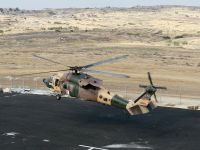A senior Iraqi official has urged the US-led coalition to airdrop packs of food and medicine to aid tens of thousands of civilians trapped in Fallujah, a Daesh stronghold under siege by security forces.
The population of Fallujah is suffering from a shortage of food, medicine and fuel, according to residents reached by phone, and sources on the ground reported numerous people had died from starvation and lack of medical care. Reports are difficult to verify due to insecurity and poor communications inside the area.
Sohaib al-Rawi, the governor of western Anbar province where Fallujah is located, explained that an airdrop was the safest way to deliver humanitarian supplies to residents after Daesh planted mines the entrances to the city and prevented civilians from leaving.
"No force can enter and secure (the delivery) ... There is no option but for airplanes to transport aid," Rawi said to al-Hadath TV on Monday. He further explained that the situation was worsening every day.
Fallujah, located 50 kilometers to the west of Baghdad, and considered an age-old bastion for Sunni militias, was the first city in Iraq to fall under Daesh control in January 2014.
The Iraqi military, police and Iranian-backed Shia militias have enacted a near total siege on Fallujah since late 2015.
Iraqi authorities recaptured Ramadi city, located a further 50 km to the west, from Daesh a month ago but it has remained unclear whether the Iraqi forces will attempt to capture Fallujah or continue to move their forces north towards Mosul, the largest metropolis under the control of Daesh.
It is estimated there are approximately 400 Daesh fighters in Fallujah, according to the US-led coalition, however other military analysts estimate the total is closer to 1,000. The coalition, which includes European and Arab powers, has not previously committed significant resources to humanitarian operations.
According to Rawi, the fighters were using civilians as human shields, similarly to their previous strategy in Ramadi – a tactic that slowed the advance of Iraqi forces.
Rawi confirmed media reports of up to 10 deaths due to starvation and insufficient medical care saying these were accurate, but Iraqi officials could not verify the details.
UN humanitarian coordinator for Iraq, Lise Grande, said the situation in Fallujah is "terrible."
"We're incredibly worried about the unconfirmed reports of people dying because of lack of medicine and widespread hunger," she told Reuters.
The UN made an appealed on Sunday for $861 million to assist Iraq in its funding gap for the 2016 humanitarian emergency response to the crisis caused by the Syrian war which has left 10 million people in need of urgent aid.








